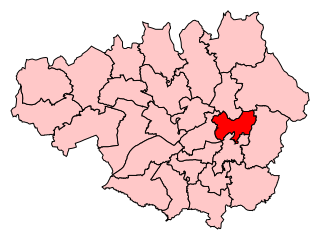The Ashton-under-Lyne by-election was held on 29 October 1928. It was notable for having the highest turnout of any Parliamentary by-election in Great Britain.

Voter turnout is the percentage of eligible voters who cast a ballot in an election. Eligibility varies by country, and the voting-eligible population should not be confused with the total adult population. Age and citizenship status are often among the criteria used to determine eligibility, but some countries further restrict eligibility based on sex, race, or religion.
By-elections, also spelled bye-elections, are used to fill elected offices that have become vacant between general elections.
Contents
The election was caused by the bankruptcy of Conservative Party Member of Parliament for Ashton-under-Lyne Cornelius Homan. Although Homan had only represented the constituency since the 1924 general election, Ashton had been represented by Conservatives for many years, and Labour had never taken the seat. However, the Conservatives had never achieved a large majority in the seat, and as both Labour and the Liberal Party had gained several seats in recent by-elections, it was thought that both would mount a strong challenge. As a result, interest in the by-election was high.

Bankruptcy is a legal status of a person or other entity who cannot repay debts to creditors. In most jurisdictions, bankruptcy is imposed by a court order, often initiated by the debtor.

The Conservative Party, officially the Conservative and Unionist Party, is a centre-right political party in the United Kingdom. Presently led by Theresa May, it has been the governing party since 2010. It presently has 314 Members of Parliament in the House of Commons, 249 members of the House of Lords, and 18 members of the European Parliament. It also has 31 Members of the Scottish Parliament, 12 members of the Welsh Assembly, eight members of the London Assembly and 9,008 local councillors. One of the major parties of UK politics, it has formed the government on 45 occasions, more than any other party.

Ashton-under-Lyne is a constituency centred on the town of Ashton-under-Lyne that is represented in the House of Commons of the UK Parliament since 2015 by Angela Rayner of the Labour Party, who has served as Shadow Secretary of State for Education since 1 July 2016 and Shadow Minister for Women and Equalities since 27 June 2016. It is considered a safe seat for Labour; in the most recent six national elections its voters have given strong majorities to the Labour Party candidate.
Labour stood Albert Bellamy, while the Conservatives stood Gordon Touche, and the Liberals put up W. G. Greenwood, an accountant.
Albert Bellamy was an English trades unionist and Labour Party politician.


